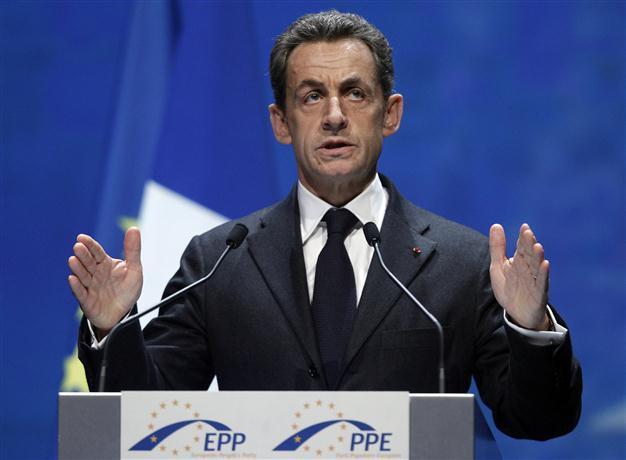Sarkozy warns 'no second chance' if euro summit fails
MARSEILLE, France - Agence France-Presse

French President Nicolas Sarkozy addresses the 20th congress of the European People's Party, EPP, Thursday, Dec. 8, 2011 in Marseille, southern France. AP photo
French President Nicolas Sarkozy warned today that there would be "no second chance" if a crucial European Union summit failed to reach a deal to save the euro.
"Never has Europe been so necessary and never has it been in so much danger ... Never has the risk of Europe's explosion been so great," Sarkozy said with only hours to go before the EU summit in Brussels.
"If we don't have an agreement on Friday, we will not have a second chance," Sarkozy told a meeting of European conservative parties in the French port of Marseille.
As EU leaders geared up for the last-chance summit to save the debt-laden eurozone from collapse, Paris and Berlin were desperately drumming up support for their plan to amend treaties to fix the currency union.
German Chancellor Angela Merkel expressed hope of a deal and urged non-eurozone EU members like Britain to back reforms.
"We will find good solutions. I'm convinced that we will find a solution to all these questions," Merkel said in Marseille, admitting that talks would be "difficult" at the EU summit.
"I ask for understanding from those who do not have the euro. We must send a strong signal to the outside. Words alone are not enough, we need more ties, we need treaty changes," she said.
The European Central Bank meanwhile sought to give the eurozone some breathing room, cutting its key interest rates for the second time in two months.
The ECB's governing council, under intense pressure to act, cut the rate for its main refinancing operations by a quarter of a percentage point to 1.00 percent at the regular monthly meeting here.
The euro immediately firmed to 1.3418 dollars from 1.3380 before the rate decision.
The Franco-German plan would impose stricter fiscal rules including legal or constitutional limits on deficits and automatic penalties for eurozone nations that overspend.
It also proposes a "new, common legal framework" to boost financial and labour market regulation, the harmonisation of the corporate tax base and the imposition of a tax on financial transactions.
The summit is facing tough obstacles, officials said, including Germany's refusal to embark on anything short of a full treaty change and British demands for protection of its vital financial services industry.

REUTERS photo
Piling on the pressure, ratings agency Standard & Poor's on Wednesday put a number of large European banks on review and placed the European Union on watch for a downgrade of its AAA credit rating - just days after it issued an identical warning to nearly all eurozone countries.
Amid fears the eurozone's woes could trigger a global economic downturn, US President Barack Obama spoke by telephone with Merkel on Wednesday, urging a "lasting and credible solution" to the crisis.
"We have great confidence in Europe, there is absolutely no doubt about that," US Secretary of State Hillary Clinton told reporters in Brussels.
"But we do need a plan to rally behind in order to know the way forward," she said.
Russian President Dmitry Medvedev also said Moscow was "very disturbed" by the crisis "because it affects the situation in the whole world and our country too." Germany poured cold water on hopes for the summit, with officials warning that talks would be "difficult" and expressing pessimism.
Prime Minister David Cameron also made it clear that Britain intended to seek a high price for supporting euro nations.
"The more that countries in the eurozone ask for, the more we will ask for in return," he told parliament. He threatened to veto any treaty change if Britain failed to receive "safeguards" from its European partners, particularly for the City of London financial services hub.
Fellow non-eurozone member Sweden also argued against treaty changes.
"I don't think that's the solution markets following us are actually looking for," Swedish Prime Minister Fredrik Reinfeldt said in Marseille, saying investors were instead looking for the eurozone to bolster its financial firewall.
Polish Prime Minister Donald Tusk said he was opposed to a multi-speed Europe, stressing that the European Union was larger than the 17-member eurozone.
Eurozone leaders have warned that if the 27-nation bloc cannot reach a deal, the monetary union could go it alone.
"We want the 27, but if there is a blockage inside the 27, we will move ahead within the 17," Sarkozy said.
Merkel, Sarkozy, European Central Bank chief Mario Draghi and three other senior eurozone figures, will stage their own negotiating huddle ahead of the Brussels summit starting at 7:30 pm (1830 GMT).
The ECB also said Thursday it would extend its liquidity-providing operations and accept a wider range of collateral from banks for loans in a bid to support eurozone banks.
Draghi told a news conference that the bank would extend its refinancing operations to include operations with a maturity of up to three years. And it would also "increase collateral availability by reducing the rating threshold for certain asset-backed securities (ABS)." A group of European labour leaders meanwhile released a public letter urging officials not to forget the "social dimension" in talks.
"We believe that the modification (of treaties) cannot have as the only objective to put constant pressure on national budgets and reinforce austerity," the union heads wrote.
burs-mm/jmm AFP

